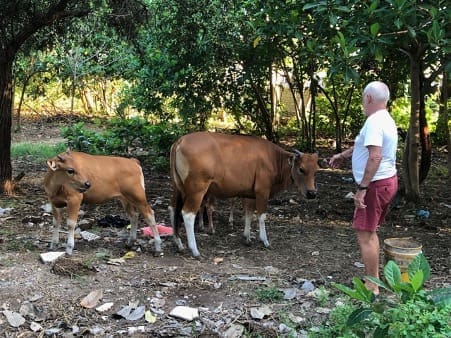RURAL Australians returning from Bali or other parts of Indonesia are being urged to consider spending an extra day in a capital city before returning home to reduce the risk of carrying FMD into rural areas.
Calls are also mounting in the heavily-exposed agriculture sector for the Federal Government to urgently introduce disinfectant foot baths at airports as a further barrier to prevent the incursion of a disease that would bring Australia’s livestock and rural economy to its knees.
FMD is a highly contagious, fast spreading disease. An outbreak in Australia would cause an animal welfare crisis and the immediate loss of access to a range of valuable export markets.
Indonesian-based livestock vet and Beef Central analyst Ross Ainsworth described the danger of transmission to Australia now that FMD has spread to the major tourist hotspot of Bali as “extreme”.
“The only sensible approach is to put disinfectant foot baths in Bali and Australian airports for tourists to walk through onto and off the plane,” he said.
“I can’t understand why this measure is being resisted considering the cost/benefit considerations.”
Nationals Leader and shadow agriculture minister David Littleproud also joined the growing chorus calling for footbaths at airports today, saying they are the “only way to effectively mitigate the vulnerability” Australia now faces.
Australia has previously been regarded as “Fortress Australia” but recent foreign disease and pest incursions including varroa mite, Japanese Encephalitis and Fall Armyworm have demonstrated that our island nation’s defences are not impregnable.
In response to the news that FMD is now in Bali, Agriculture Minister Murray Watt and Chief Veterinary Officer Dr Mark Schipp have this week announced that border biosecurity measures have been ramped up.
Just briefed by some of Australia’s leading biosecurity experts on latest re foot and mouth outbreak in Bali & best practice measures for inbound travel. Thanks to @DAFFgov @CSIRO @CEBRA_UoM @MarkSchipp for your advice. Our Govt is determined to keep our livestock industry safe.
— Senator Murray Watt (@MurrayWatt) July 7, 2022
These involved new targeted operations at major airports servicing travel from Indonesia to check a wider range of passengers who could be contaminated with FMD or be carrying contaminated goods and assessment of all passengers on flights from Indonesia, with high risk passengers identified for intervention.
Specfic measures included locating biosecurity detector dogs in Darwin and Cairns Airports, additional signage and the distribution of flyers at major airports, informing travellers of FMD risk and precautions, expanded social media campaigns, additional training of airport biosecurity staff, enhancement of mail profiling and inspections, and boarding by biosecurity officers on arriving flights from Indonesia.
However disinfectant footbaths in airports are not among the measures announced so far.
Minister Watt told the ABC last night that he would not force travellers to walk through foot baths, noting many would be wearing thongs, adding that the disinfectant required would be too caustic on exposed skin.

Bali is one of the rare places where tourists come into regular contact with cattle that are present on many streets, as Ross Ainsworth has previously explained.
It is one of the many reasons why people throughout Australia’s livestock sector are gravely concerned about the risk of transmision posed by returning travellers.
One senior red meat industry figure suggested to Beef Central that travellers returning from Indonesia to rural areas in Australia should consider the additional precaution of spending one more day in the capital city to which they return before travelling home, to reduce the chance of any trace of FMD being active when they travel back into an agricultural area.
Some sources have told Beef Central that FMD can live on the clothing and body of travellers for up to 48 hours, particularly in the form of manure on boots or in moist areas such as the nostrils.
A Department of Agriculture spokesperson said Australia’s AUSVETPLAN for FMD states that the risk of prolonged carriage of the FMD virus on travellers is considered to be low.
The same source states there is little evidence to suggest that such people play a significant role in transmitting FMD under field conditions.
Dr Ainsworth’s advice as a practicing vet with decades of first-hand experience working through northern Australia and south east Asia is that people returning from Bali to Australian farms should be taking additional precautions.
“My choice if I was a rural person returning from Bali to my farm is that I would launder and scrub everything before getting on the plane then work on my shoes and other clothing and equipment that might have been contaminated from my hotel to the airport when I arrive in Australia.
“But spending longer in the city after arrival would be effective too.”
[ad_2]
Originally Appeared Here